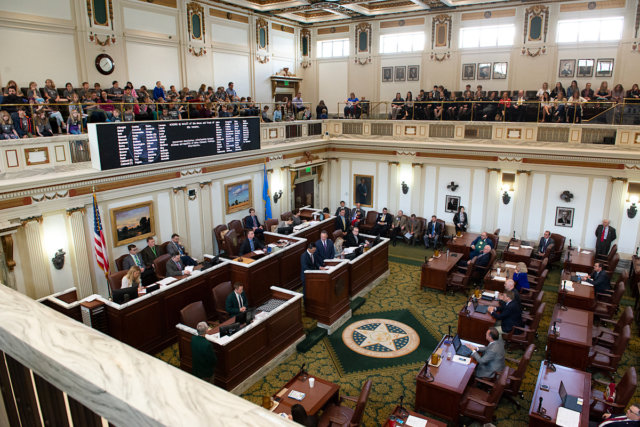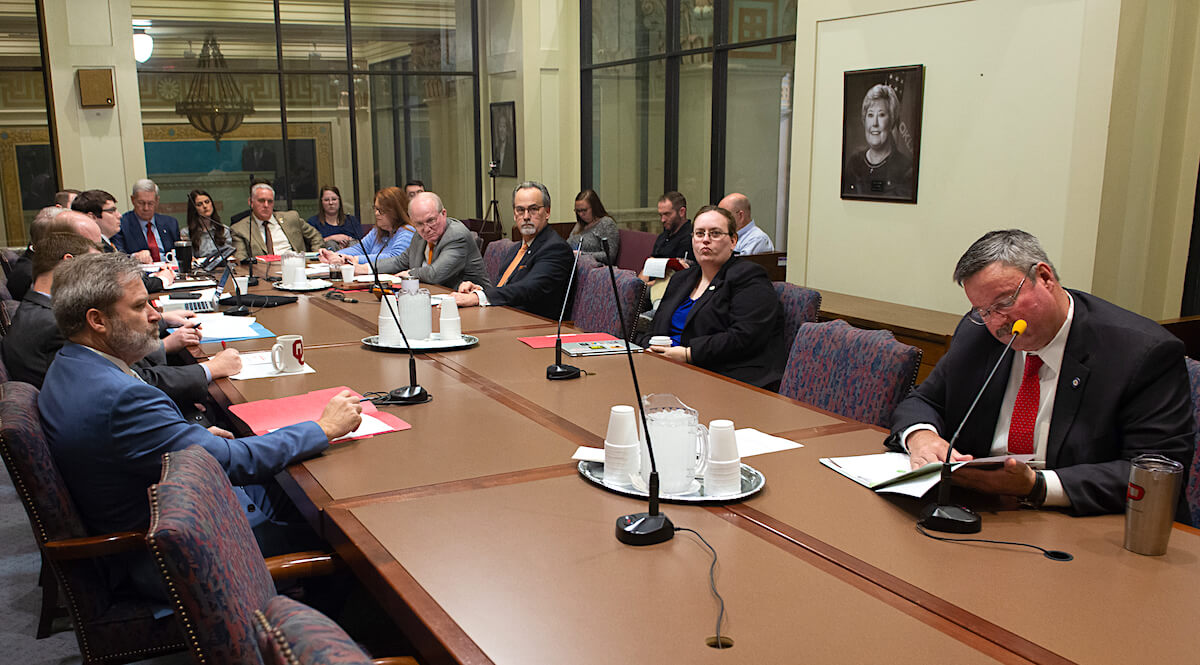

All signs point to a looming legislative agreement on how to appropriate money for Oklahoma’s FY 2020 budget. Some Capitol insiders expect an agreement within two or three days, but others suspect the process could drag on further after a series of chess moves last week.
Wednesday, confirmation of Gov. Kevin Stitt’s budget secretary nominee, Mike Mazzei, stalled in an ugly fashion over transparency concerns from senators. Stitt and Senate President Pro Tempore Greg Treat (R-OKC) met Wednesday to discuss the dust up, and each held press conferences Thursday
Stitt laid out his narrative, pushed for savings and said “cooler heads” should prevail on Mazzei’s nomination. Later, Treat revealed a proposal from his caucus’ aimed at ending the legislative stalemate over whether to mandate an across-the-board teacher pay raise or provide some schools more financial flexibility.
“I want to respect the process, but you keep asking me numbers,” Treat told media. “The Senate has sharpened our pencils, looked through the budget — day after day, month after month — and we feel very comfortable that we can reach the savings goal that the governor has outlined as well as put $200 million more in common education.”
That’s two legs of the Capitol tripod at different microphones.
House leaders, meanwhile, have been publicly silent in response to Stitt and Treat’s pressers, having stood firm for weeks on their belief that all teachers should receive a $1,200 pay raise. Articles Friday in The Oklahoman and Tulsa World did not feature new comments from any House member in response to the Senate’s proposal.
Neither did an Associated Press story posted Thursday afternoon that framed Treat’s comment as Stitt and the Senate having “reached a tentative agreement” to fund a $1,200 teacher pay raise while pumping another $130 million through the state equalization formula and achieving the $200 million in savings Stitt has sought all year.
Absent from Thursday’s microphones, GOP House members privately debated how to react. With few details of budget negotiations having been publicized so far, they wondered whether media would proactively piece together the mathematical equation: If Stitt gets his full savings request and the Legislature chooses a Senate-proposed “both” plan for an across-the-board teacher pay raise and substantial classroom investment, other agencies and programs that were slated to receive new funding almost surely would not.

There’s only so much butter in the tub
Multiple other legislative and agency priorities could be in jeopardy if lawmakers and Stitt direct the bulk of new revenue into savings and common education. Beyond public employee pay raises and appropriation hikes for agencies like Career Tech, an attempt to address Oklahoma’s problematic Developmental Disabilities Services waiting list might seem less feasible under that scenario.
According to the Oklahoma Department of Human Services’ website on Sunday, 5,649 developmentally disabled individuals are waiting for waiver-authorized access to home-based and support services. In March 2018, the site showed 7,664 individuals waiting for services. The issue has received public scrutiny in recent years, with lawmakers able to give DHS some new resources for the program last year owing to the 56th Legislature’s new revenue efforts.
This session, however, public attention toward health and human services funding has been limited, if not altogether lacking. Debate over whether to expand Medicaid coverage for lower-income adults has drawn headlines, but health leaders have recently been silent in terms of other public messaging.
Addressing the DDS waiting list and increasing Medicaid provider rates have appeared to be two of the most likely health care developments this session. How the Senate and governor’s purported “deal” would affect those goals remains to be seen, but adding money to common education or to the governor’s savings plan would presumably trim dollars for other efforts.
Perquisite (noun): a privilege, gain or profit incidental to regular salary
Speaking of “other efforts,” some onlookers have expressed concern that “pork” could sneak its way into this session’s appropriations process owing to the rosy revenue outlook. Stitt addressed the issue Thursday, pushing back against senators who criticized an apparent policy blocking them from getting certain numbers from state agency directors without consulting Mazzei or other gubernatorial staff.
“What we won’t allow is to go straight to our cabinet secretaries in the middle of budget negotiations when they are trying to maybe advocate for some pet projects that they are working on individually,” Stitt said.
Oklahoma Republicans have long bemoaned — and lobbyists now enjoy laughing at — the state’s history of legislative pork during 100 years of Democratic control. It’s not difficult to find a former lawmaker who can recount “special project” funding and other line-items used to ensure budget votes or support for a major policy bill. Some current lawmakers can tell the stories, too, explaining how something that was or was not funded 20 years ago remains a contentious issue in their districts today.
But Republicans have controlled the Oklahoma House and Senate long enough now to be faced with the same possible perquisites that routinely ruffled feathers in past legislatures. With lots of money to allocate for the first time in recent history, legislative leaders could scrape the barrel for $1 million here or $500,000 there for special projects they believe would benefit some part of the state.
This week, should lawmakers and the governor stand together as all three legs of the state stool and announce a budget agreement, media, lobbyists and agency liaisons will be frantically pouring through the general appropriations bill (and any other late-night filings of JCAB language) to see what exactly five months of budget negotiations have yielded.
Put another way: Get ready to brew a pot of coffee once you hear the actual announcement of a deal. The devil is in the details.




















